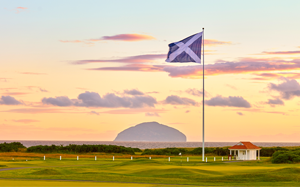Sign up for our daily newsletter
Latest news, reviews, analysis and opinion, plus unmissable deals for bunkered subscriptions, events, and our commercial partners.
Unenviable position: Northern Ireland’s Rory McIlroy is at the centre of an Olympic Games ‘tug-of-war’
McIlroy seems to be in a ‘no win’ situation over his ‘cultural identity’
As it turned out, he had done no such thing, which he revealed in an open letter to his 1.3 million Twitter followers on Monday.
Why the need for such a public and swift denial of these headlines? Simple: whichever decision Rory makes with regard to the Olympics, he is going to upset a lot of people – and for more than purely sporting reasons.
Hailing from Northern Ireland, McIlroy has a legal entitlement to dual citizenship, which in turn makes him eligible to represent the rather poorly monikered ‘Team GB’ – surely ‘Team UK’ would be a more accurate reflection of the side – as well as ‘Team Ireland’.
And therein lies the problem: Rory, like the rest of Northern Ireland’s sportsmen, has to make the decision over which of the two countries to represent. And given the fraught political history between the two – and Northern Ireland’s position slap bang at the centre of the animosity – Rory has a frankly impossible decision to make.
The recent skirmishes in Northern Ireland are proof that, in certain quarters, hostility and sectarian resentment stills lingers like a dark, grey cloud over the Emerald Isle.
As such, what should be a relatively straightforward decision for Rory has become one mired in narrow-minded politics.
Choose GB, he upsets the people in Ireland. Choose Ireland, he upsets the people in GB. It is, without question, a prime example of a ‘no win’ situation. He’s damned if he does and damned if he’s doesn’t.
There is, though, one more option available to Rory if he wishes to consider it: represent neither and save himself a lot of hassle.
By doing so, he would effectively snub neither country. Instead, he’d side-step a fight that isn’t his and which surely nobody wants to see him dragged into.
In fact, the only snub he’d deliver would be to the Olympics, which might not be such a bad thing. After all, in 40 or 50 years time when he reflects upon his career, what will his mind wander to first: his (hopefully) numerous major victories or his Olympic medals?
Golfers’ careers are defined by majors and majors alone. Tiger Woods? A 14-time major winner. Jack Nicklaus? An 18-time major winner. Gary Player? A nine-time major winner. Colin Montgomerie? Arguably the best player never to have won a major. That’s the way it goes in golf, the way it always has gone. Even being world No.1 – and statistically the best player in the world for that period – carries much less clout than a major win. So, where in the grand scheme of things does, or indeed will, Olympic success fit in? Chances are somewhere way down the pile.
Here’s a question: have you ever heard of George Lyon? No? He was the last person to win an Olympic gold medal for golf. You’ve not heard of him because Olympic golf carries no weight in the game. Not then, not now, not ever. Of course, if Mr. Lyon had won a major, different story, you would almost certainly have heard of him.
It is the same in other sports where medaling in the Olympics is not the pinnacle of a player’s achievement. No-one ever talks about the fact that Lionel Messi, the Barcelona footballer, won Olympic gold with Argentina in 2008. They don’t talk about it because it’s not important. Also, notice how quickly Andy Murray’s soubriquet has changed since he won his first Grand Slam last weekend. He’s no longer ‘Andy Murray, Olympic gold medallist’. Now, he’s ‘Andy Murray, US Open champion’.
It will be much the same in golf and most likely will stay that way for at least two generations, maybe three, perhaps four.
Now, okay, Rory might want to say that he’s an Olympic medallist, or indeed that he competed in the Games. But it is a hassle that he doesn’t need, so why bother?
The 23-year-old could well save himself a lot of heartache, harassment and haters by simply saying ‘thanks but no thanks’ to the quadrennial sporting showpiece.
Certainly as it stands, it would appear to be the best option available to him.
ALL ABOUT THE MASTERS
More Reads

The bunkered Golf Course Guide - Scotland
Now, with bunkered, you can discover the golf courses Scotland has to offer. Trust us, you will not be disappointed.
Find Courses









